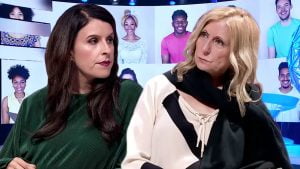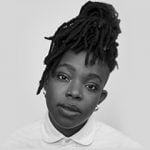Gender Equality Debate Recap
by Laura M. Browning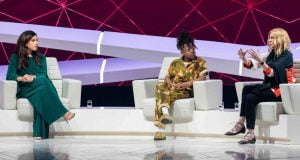
On March 9, 2020, the day after International Women’s Day, Doha Debates hosted a lively debate at Education City’s Northwestern University campus in Doha about gender equality. Moderator Ghida Fakhry opened with a striking fact: Experts estimate that it will take another century before we close the gender gap. Framing this debate is the question of whether gender quotas are the answer — would quotas accelerate change, or would they be ineffective or even demeaning.
Studies have shown that when gender equality increases, so does overall life satisfaction — for everyone, not just women. All over the world, women persistently make less money than men for the same work. Equality may be a simple concept, but achieving it is a pretty complicated task.
Because of an abundance of caution over a novel coronavirus, this debate was held without an in-person audience; instead, students and other viewers tuned in from Brazil and Turkey to Japan, and sent in questions and comments via Twitter, Instagram, YouTube and Facebook.
As the three speakers established their positions, it was clear that finding common ground among them was going to be a tall order. Randa Abdel-Fattah, a novelist, lawyer and human rights advocate from Australia, called for gender quotas that also accounted for intersectionality. She argued that, for too long, we’ve approached the problem of gender equality as though it’s based on a single axis of oppression. The reality is that we must disrupt both gender and racial inequalities. American writer and scholar Christina Hoff Sommers strongly opposed gender quotas, claiming they are demeaning to women and that gender equality must happen organically. Ayishat Akanbi, a cultural commentator, artist and stylist based in London, took the middle ground, arguing that quotas could be a strong short-term solution, but that the real goal must be to create a society where they aren’t needed.
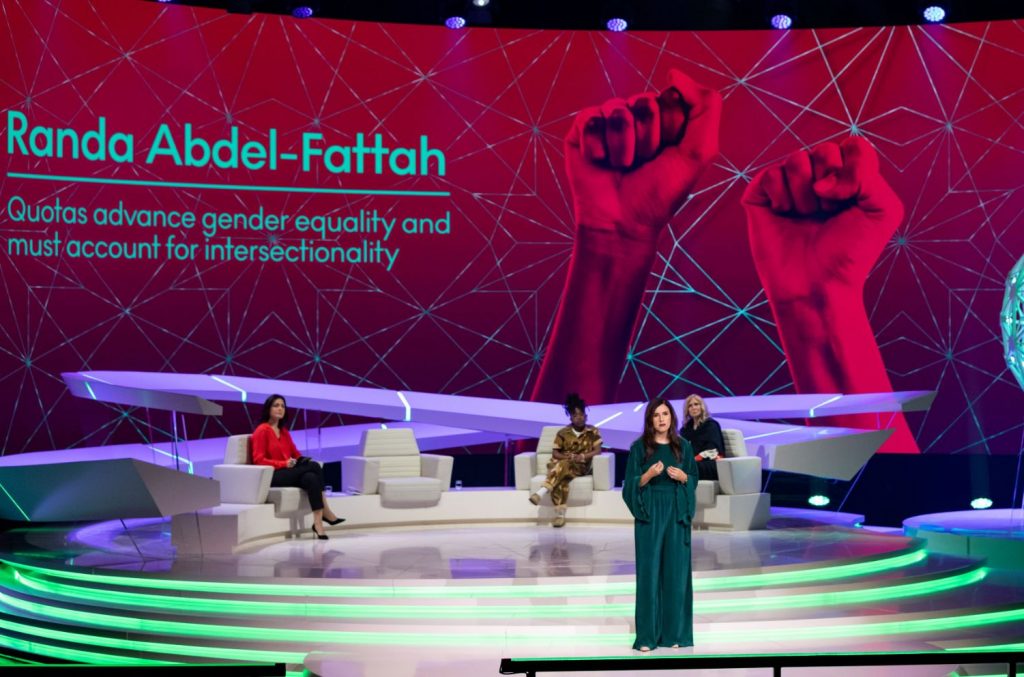 Debate speaker Randa Abdel-Fattah
Debate speaker Randa Abdel-Fattah
Randa set the tone early on in the debate, pointing out how a complex issue like gender inequality can’t be solved by looking through a narrow, limited lens: “[I am] unapologetically upfront about the need to disrupt not only gender hierarchies, but equally, racial hierarchies.” Affirmative action is already being used as the default, she argued — and it’s given us a world in which academia and corporate leadership are dominated by white men, who then hold the keys to the most social, economic and political power. To illustrate the need for intersectionality, Randa said that of the 19,000 university professors in the UK, around 4,000 are white women — and just 25 are black women. “Gender inequality clearly impacts on women, but some more than others.” White women enjoy racial privilege even as they fight sexism, and by defining women as a single axis of oppression, we further entrench ourselves in racism. “We need gender quotas to pursue a radical redistribution of this power dynamic,” Randa said, urging listeners to envision new and revolutionary forms of leadership and teaching.
“Gender inequality clearly impacts on women, but some more than others.”
—Randa Abdel-Fattah
Intersectional quotas, used in the right manner, could help close the gender gap without further marginalizing people of color. And that, she said, is essential to give women and people of color the opportunity to transform and revitalize knowledge production, academia and other key sites of power.
Ayishat countered that “if we don’t like gender quotas, as many of us do not, then we have to be active in building a world where they are unnecessary.” Quotas might seem like a no-brainer in this world of gender strife and ideological mayhem, she argued, but they are likely to cause tension among colleagues — especially if you believe your colleagues think you’re there just because you’re “a tick on a diversity checklist.” Being tokenized in this way adds the burden of feeling like a spokesperson for your entire group, rather than having the freedom to express individual viewpoints.
“If we don’t like gender quotas, then we have to be active in building a world where they are unnecessary.”
—Ayishat Akanbi
Gender equality must not be relegated only to boardrooms and academia, Ayishat says, because otherwise we care more about power than we do equality. Plus, there’s a societal benefit to men entering spaces that have historically been overrepresented by women. Individuals are individuals, she said, not spokespeople for their particular identities or groups. True liberation, then, would be being seen for who you are, not what you are. Quotas may work sometimes, but we need a more holistic approach that includes a radical reorganization of society — something that Randa also alluded to — and a serious rethinking of traditional gender roles.
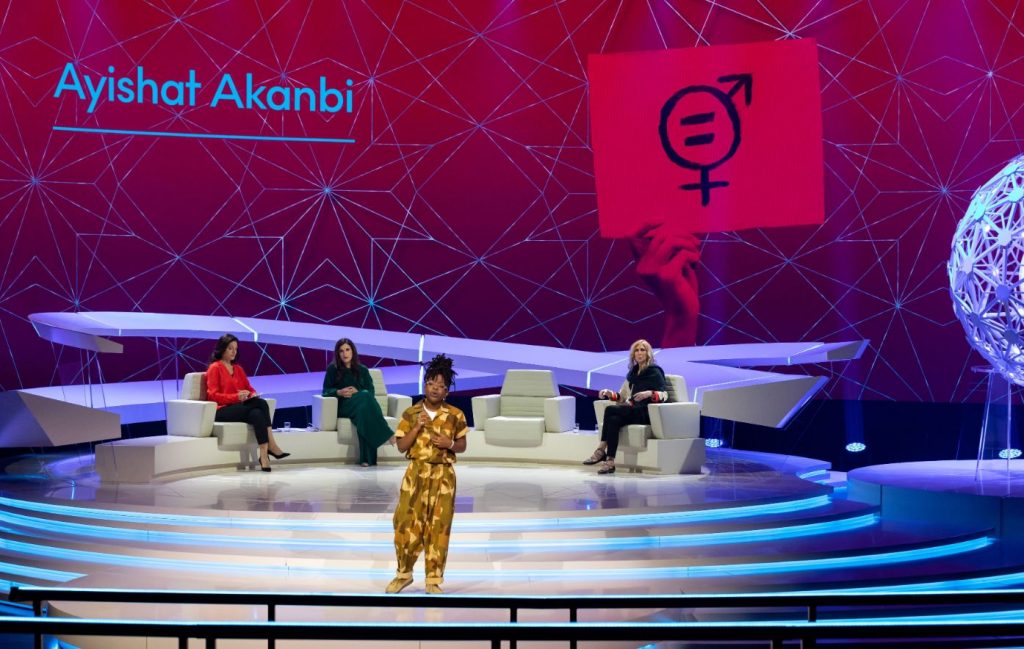 Debate speaker Ayishat Akanbi
Debate speaker Ayishat Akanbi
Christina opened her argument by stating a strong belief in gender equality — but just as strongly, she denounced quotas as the means to that end. Citing a 2018 Economist article that looked at a decade’s worth of corporate gender quotas in Norway, Christina claimed that there is no evidence that gender quotas work. In less prosperous, non-democratic societies, quotas “are doing actual harm” because they pull talented women “out of mainstream society, where they are desperately needed, into the government,” where, she says, they are forced to be silent, creating a veneer of equality. She gave the example of Rwanda, where more than 60 percent of the parliament is made up of women — but contended that this, in fact, works against women. In everything we do, we must treat individuals as individuals, not as tokens. Quotas are ineffective, harmful and send the wrong message to women, she argued. And although there is no fixed solution to gender inequality, progress will come out of free expression and discourse.
 Debate speaker Christina Hoff Sommers
Debate speaker Christina Hoff Sommers
The debate’s liveliest exchange began with Randa talking about the ways that her identities have been weaponized against her: she’s Australian, Palestinian, Egyptian, Muslim, a woman and a feminist, and there are spaces in which one or more of those identities prevent her from being seen as an individual. And with 94.4 percent of Australia’s elected members of parliament being of Anglo-European white background — even as a quarter of Australians are born overseas — race matters. Christina said that she had seen studies that place the U.S. and Australia among “the least racist countries” in the world. Randa replied, “That’s actually grossly offensive,” which Christina wrote off as being her “opinion.” “It’s my experience,” Randa said. “Please don’t talk to me about race in Australia.”
Dr. Govinda Clayton, the debate’s connector, joined the speakers on stage and acknowledged that he was the only man present for a debate about gender equality. At risk of “mansplaining,” he said, he encouraged the speakers to find some agreement among their positions. One point of consensus was that nobody thought that “gender quotas, in and of themselves, were a golden bullet or a panacea that would resolve the deeper inequalities we have.” He also pointed out that everybody spoke, in their own way, about the need for a more holistic solution. He encouraged the speakers to go further, broadening their focus beyond binary terms to think about the function that quotas are trying to achieve.
Ayishat said that symbolism does carry some weight: It’s human nature to want to do what other people are doing, so seeing more women in, for instance, national governments, might encourage more women to seek out those positions. Quotas, she conceded, might be beneficial in that space. But we also have to think about the reasons for social imbalances that might not be due to discrimination.
Christina agreed with Ayishat that not all discrepancies in society are due to discrimination. But she was unwilling to concede that quotas have any place anywhere in society. There are better ways, she says, to achieve diversity and equality, and that change must happen organically for it to be effective. “Quotas are rigged and cause more problems than they’re worth.”
“Quotas are rigged and cause more problems than they’re worth.”
—Christina Hoff Sommers
 From left: Debate moderator Ghida Fakhry and speakers Randa Abdel-Fattah, Ayishat Akanbi, and Christina Hoff Sommers
From left: Debate moderator Ghida Fakhry and speakers Randa Abdel-Fattah, Ayishat Akanbi, and Christina Hoff Sommers
Randa disagreed strongly, saying that although the beginnings of a quota system might be seen as tokenistic — especially if you’re the sole woman on a corporate board, and everybody knows you’re there to fulfill a quota — we should shift the onus to why there is overrepresentation rather than underrepresentation. Why do men evade similar scrutiny? “What have the majority of men in a boardroom or academia done to deserve being the majority?” This isn’t about evil men vs. good women; it’s about structures that need to be challenged and overturned.
“This isn’t about evil men vs. good women. There is an imbalance, and it needs to be redressed. The quota system is one way to do that.”
—Randa Abdel-Fattah
The one point that all speakers agreed on, at least, is that diversity has merits. How we achieve it, though — that’s still very much up for debate. The divergent ideologies were reflected throughout the debate through a series of online polls. At three different points, viewers were asked to assign 100 points, divided as they saw fit, to each of the three positions. As the Majlis evolved, so did the poll results. After the opening statements, Ayishat’s middle position received the most votes, with 40.84 percent of the total. By the end of the debate, the positions had shifted, with Christina’s anti-quota position receiving 41 percent of the vote, Randa’s pro-quota position receiving 32 percent, and Ayishat’s receiving 27 percent.
Throughout the debate, livestream viewers also shared their opinions and personal experiences with gender inequality.
In the post show, Correspondent Nelufar Hedayat spoke with Professor Zarqa Parvez of Hamad bin Khalifa University in Qatar on her takeaways from the onstage debate. Zarqa, whose research interests include women, identity and nationalism in the Gulf region, pointed out that some of the terms used onstage by the speakers — like representation, elitism, tokenism, and intersectionality — might still be new to debate viewers, and helpfully broke down some of the definitions.
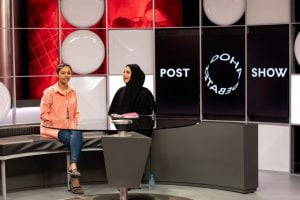 From left: Debate correspondent Nelufar Hedayat and Professor Zarqa Parvez
From left: Debate correspondent Nelufar Hedayat and Professor Zarqa Parvez
The professor also disagreed with Christina’s “romanticization [that] change will happen organically.” We do not, she said, have the privilege of waiting a hundred years or more, particularly in the Middle East, where it could be even longer. Zarqa noted that “the patriarchy uses religion sometimes as a tool to prevent women or advance political agendas.” But, she says, there is hope. As a student at Georgetown University in 2010, she started the Women’s Society and Development Club to address her dissatisfaction with what she was learning in classes, allowing her to engage with society and step outside the hegemonic framework.
This show, which took a global view of gender inequality, ended with a truly global dialogue between Nelufar and a group of students and other viewers who called in live or submitted video reactions via Instagram. Eden Kebede, a student from Northwestern University in Qatar, ended the post show with a poignant argument for quotas: “It’s not like I can’t get that job,” she said. “It’s more about reparations for the oppression that my mothers and all of the generations went through. … There are women everywhere with different cultural backgrounds, and you just need to have that in mind so that we can find a common ground and we can fight against the patriarchy instead of fighting against each other.”

Watch the entire debate
Gender Equality

